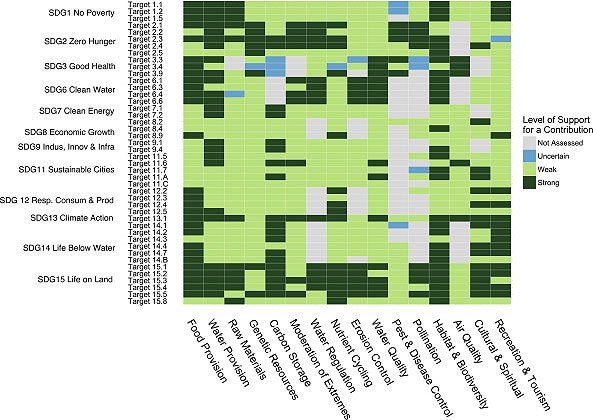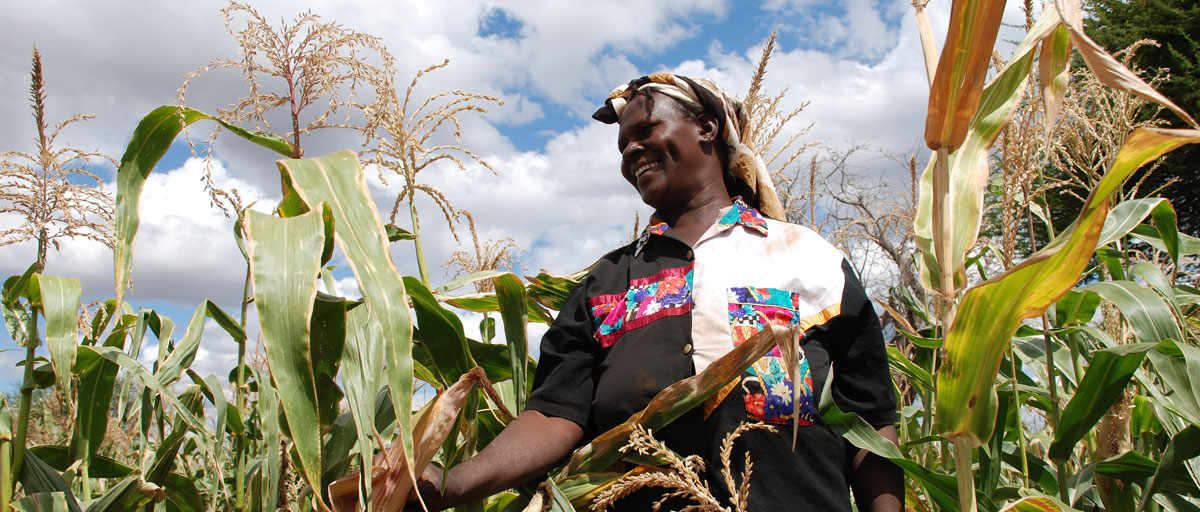Bildtext får vara max två rader text. Hela texten ska högerjusteras om den bara ska innehålla fotobyline! Photo: B. Christensen/Azote
Ecosystem services
Time for a more prominent role
Despite being essential for several of the Sustainable Development Goals the role of ecosystem services have largely been ignored
- The UN Sustainable Development Goals (SDGs) consist of 17 goals and 169 targets aimed to “end poverty, protect the planet and ensure prosperity for all” by 2030
- Practical strategies for achieving these aims, particularly how ecosystems can be both protected and managed to support human well-being, are not specified
- A network analysis shows that most services contribute to targets across more than one goal
When sustainability scientists talk about a “disconnect” between people’s lives and the natural environment around them they refer to a misguided belief that humans can do just fine without nature, oblivious about their close dependence of it.
The reality, of course, is different. Without nature we have nothing.
Central to our taken-for-granted living standards, is a term which is unfamiliar to many but fundamental to our very existence: ecosystem services, or the benefits people obtain from nature. This can be everything from providing clean air and water, pollination of food crops or nature experiences that can last for a life time.
A clearer understanding of their importance
Despite this, international attempts to define goals that can achieve human well-being while protecting the environment are still modest in their acknowledgement of these services. The UN Sustainable Development Goals (SDGs) which was launched in 2016, consist of 17 goals and 169 targets aimed to “end poverty, protect the planet and ensure prosperity for all” by 2030. But practical strategies for achieving these aims, particularly how ecosystems can be both protected and managed to support human well-being, are not specified.
To realize the ambitions embodied in the SDGs, it will be essential to manage ecosystems to protect nature and the sustainable supply and equitable access to the services nature provide
Line Gordon, co-author
In a recently published paper in the journal Ecosystem Services Line Gordon and colleagues call for a clearer understanding of how ecosystem services are important to the attainment of the SDGs.
Sound ecological management is required not just to constrain the environmental costs of meeting these goals, but also to enhance or at least sustain the flows of ecosystem services to people, they argue.
Relevant to almost all targets
To underline the importance of ecosystem services to the SDGs, the researchers conducted a survey among experts on ecosystem services. The intention was to get a better understanding how good management of 16 specific ecosystem services could contribute to one or several of 44 of the 169 SDG targets. These 44 targets were selected because they had a strong focus on environmental and/or human well-being.
Results from the survey showed that at least one of the 16 ecosystem services was deemed important for reaching 41 of the targets while several of the targets where thought to receive important contributions from two or more ecosystem services. Provision of food and water, and habitat and biodiversity maintenance were perceived as contributing to the greatest number of distinct targets.
"Our network analysis shows that most services contribute to targets across more than one goal. This means that policy-makers working on achieving the SDG targets will need to manage several services at the same time in order to realize these positive benefits," says lead author Sylvia Wood at Bioversity International.

Heat map of the perceived level of support for ES-T contributions based on responses of surveyed experts. Grey indicates ES-T combinations that were not assessed any respondent. Click on illustration to access article.
Risk for insufficient solutions
Wood and her colleagues recognize that ecosystem service management alone will not be enough to achieve the ambitious SDG agenda but “all too often ecosystem services are undervalued in planning processes,” they argue. This can lead to insufficient solutions in the long term which is what has happened in Mississippi where levying of the river to prevent flooding has altered the hydrology sustaining the surrounding wetlands needed to buffer the coastline against storm surges.
“Social and technology-based solutions should be planned in concert rather than in competition with ecosystem-based approaches,” the authors say. A large number of modelling tools are already available for policy-makers to better incorporate ecosystem services in their work on the SDGs.
A more robust approach
Pairing ecosystem service management with technologies and social needs assessments will guarantee a much more robust approach to achieving the SDGs. For example, to achieve SDG goal number 6, “availability and sustainable management of water and sanitation for all”, a combination of installing water treatment plants alongside catchment land cover and improved land use management is required.
Similarly, efforts to eradicate malaria will require a wide range of efforts including better pest and disease control, in combination with insecticide-treated bed nets and the development of national health programmes that can better educate and treat affected communities.
Based on the survey, the response from an international community of experts on ecosystem services is clear: achieving well-being for all while protecting the environment is impossible without considering the importance of ecosystem services.
Methodology
The authors conducted an anonymous online survey to evaluate linkages between SDG targets and 16 specific ecosystems services taken from the TEEB ecosystem services typology (TEEB 2010). The 16 selected ecosystem services include provisioning, regulating, supporting and cultural services. An online survey tool
(SurveyMonkey) was used to create the survey and was sent out from 29 April to 30 May, 2016 through academic and professional listservs to ecosystem service experts. A second round of the survey was conducted from 15 March to 23 March, 2017.
The respondents were asked choose up to three ecosystem services in line with their expertise and evaluate their potential contribution to targets under one to two SDG goals they felt competent to assess. For each selected ecosystem service-SDG target combination (ES-T), respondents were asked i) if they ‘Agreed’, ‘Disagreed’ or ‘Didn’t know’ whether good management of the selected ecosystem service could directly or indirectly help to attain the stated target; ii) to rank the importance of the ecosystem service contribution to target achievement on a four-point scale from ‘Not important’ to ‘High’; and iii) to assess confidence in their own evaluation of this ES-T relationship on a five-point scale from ‘Very Low’ to ‘Very High’. Median responses were used in the analysis of these data.
Wood, S. L.R., Jones, S., Johnson, J.A., Brauman, K.A., Chaplin-Kramer, R. et.al. 2017. Distilling the role of ecosystem services in the Sustainable Development Goals. Ecosystem Services, Volume 29, Part A, February 2018, Pages 70–82. DOI: 10.1016/j.ecoser.2017.10.010
Line Gordon is the deputy science director and deputy director at Stockholm Resilience Centre. She is also assistant professor with a focus on freshwater resources, ecosystem services and food production.









